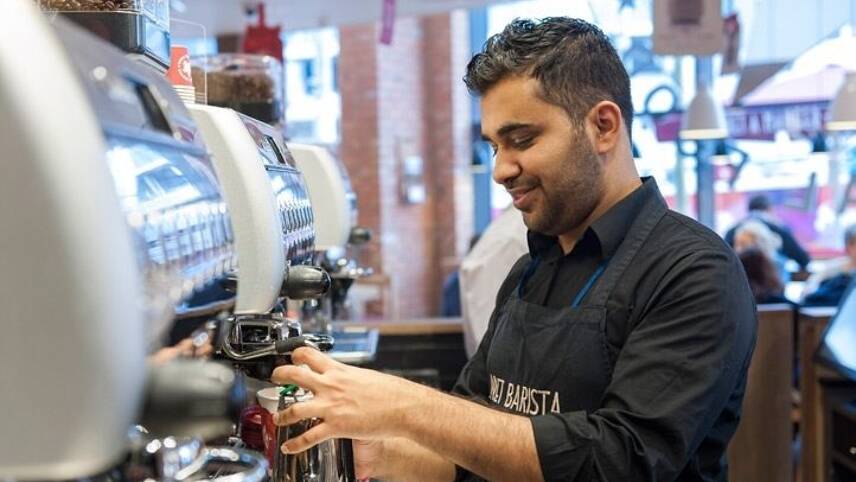Register for free and continue reading
Join our growing army of changemakers and get unlimited access to our premium content

Between 2016 and 2018 UK paper cup recycling rates increased 16-fold Image: Pret
The expansion of the in-house coffee cup recycling initiative means that almost 90% of Pret shops across the UK have the capability to recycle paper cups on the shop floor. Pret has confirmed that it is accepting cups from other brands as part of the scheme.
Pret’s director of strategy & sustainability, Laura Gutowski, comments: “Doing our bit for the planet is enormously important to us at Pret. We are absolutely committed to improving recycling rates of our coffee cups and we want it to be as easy as possible for customers – and those passing our shops – to get involved.
“That’s why we have put our recycling points on the shop floor, rather than hidden away behind the counter, and why we’ll happily accept any high street coffee cups, not just those from Pret.”
Up to seven million coffee cups were thrown away annually in the UK with less than 1% of these cups (only 1 in 400 coffee cups) thought to be recycled. However, between 2016 and 2018 UK paper cup recycling rates increased 16-fold, reaching 1 in 25 cups recycled in 2018. In 2019 the number of cups recycled in the UK reached 120 million.
The materials from the cups will be separated and recycled to create high-quality stationery and packaging products.
Pret A Manger has been working with companies such as Simply Cups and A Short Walk to introduce recyclable and renewable packaging for its coffee cups.
In January 2018, Pret doubled its discount for customers who bring in their own reusable cup to 50p. As a result, the number of consumers using reusable cups has increased almost 20-fold. In fact, more than 150,000 drinks are served in reusable cups every week and Pret has avoided the use of more than six million paper cups since doubling the discount. The company had been offering a 25p discount for customers who use reusable cups since April 2017.
With research showing that an estimated 2.5 billion paper coffee cups are discarded in the UK each year, high-street chains have responded to media and consumer backlash. Pret A Manger’s original discount followed similar schemes from other coffee chain shops.
Both Costa Coffee and Starbucks have introduced discounts for consumers with reusable cups.
Costa Coffee launched a recycling scheme in all of its stores to ensure that as many as possible of its own takeaway cups – and those from its competitors – are recycled. Starbucks followed with a similar initiative, launching a new in-store paper cup recycling bin aimed at encouraging customers to return take-away cups back into the store and boost overall recycling levels.
Rare luxury
While the use of reusable cups is welcome, new research from the Fairtrade Foundation suggests that coffee, along with tea and cocoa, could become a rare luxury in future due to the threats posed by climate change.
The Foundation has warned that farmers are on the “frontline” of the climate crisis and that a systemic focus of companies seeking to drive profits while pushing down prices has made coffee farming unsustainable. Notably, the foundation claims that farmers are constantly struggling to generate enough income to support their families.
In the Southern Hemisphere, farmers are threatened by natural disasters, disease and pest destroying crops, all of which could be exacerbated by climate change.
The Foundation’s chief executive Michael Gidney said: “Conventional trade exposes producers to huge risks because of price volatility in commodity markets. That, together with the impact of climate change on harvests is pushing millions of farmers and workers in the Global South further into poverty and debt.
“We must tackle the scandal of our broken food system. This is not a warning about a future calamity; today in many communities around the world farmers cannot feed their families. This is an outrage in a world where obesity is on the increase. But it is also short-sighted: if farming doesn’t pay then producers will be forced to leave their farms to look for work. Sooner or later, this affects us all and we need action now.”
In response to these looming threats, many businesses are developing sustainable sourcing practices for commodities that also benefit the farmers and growers.
In 2017, Walmart made a commitment to sustainably source the private brand coffee found in its US stores by 2020. Today (1 October), the company has announced that all coffee sourced for these brands has been certified sustainable through third-party groups Fair Trade, Rainforest Alliance Certified or UTZ – one year ahead of schedule.
Matt Mace


Please login or Register to leave a comment.